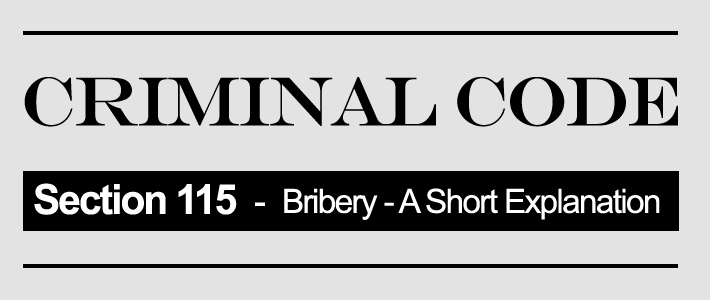Section 115 of the Criminal Code
Bribery
115.(1) Any public officer or servant who, in connection with his office or employment, requests, receives or accepts for himself or for any other person, any reward or promise or offer of any reward in money or other valuable consideration or of any other advantage to which he is not entitled, shall, on conviction, be liable to punishment as follows:
- where the object of the reward, promise or offer, be to induce the officer or servant to do what he is in duty bound to do, the punishment shall be from six months to three years;
- where the object be to induce the officer or servant to forbear from doing what he is in duty bound to do, the punishment shall, for the mere acceptance of the reward, promise or offer, be imprisonment for a term from nine months to five years;
- where, besides accepting the reward, promise, or offer, the officer or servant actually fails to do what he is in duty bound to do, the punishment shall be imprisonment for a term from one year to eight years.
(2) Notwithstanding any other provision of this Code or of any other law, when the offence against the provisions of this article is committed by a person who, at the time when the offence was committed, held the office of Minister, Parliamentary Secretary, Member of the House of Representatives, Mayor or Local Councillor and the offence involved the abuse of such office, the provisions of Title VI of Part III of Book Second of this Code shall not apply to the said person or accomplice.
Professor Sir Anthony Mamo. Notes on Criminal Law Part II page 85 et seq.
- The public character of the offender
-
The acceptance of a reward or promise or offer of a reward not due according to law.
-
In connection with his office.
-
The purpose to do or to fail in his duty.
The character of public officer or person employed under the Government is the first essential of this crime. The wording is very wide and embraces all officers or employees under the Government. It includes all pubic officers or employees whether their duties are judicial, ministerial, executive or mixed.
The second ingredient of this crime is the acceptance for himself or for others of a remuneration or promise or offer of a remuneration which is not due to him. It is essential that the corruption should take the form of this acceptance of gifts or rewards or the promise or offer of gifts or rewards whatever their kind and whatever their value provided they represent some advantage to the grantee.
It is not necessary that the reward or the promise or offer be made to the pubic officer personally or be by him personally accepted. The crime subsists just the same if the public officer has acted through an intermediary, and whether the advantage was to be enjoyed by himself or by others, provided the intermediary has acted with the consent of the public officer and provided that the reward or promise made to a third party in consideration of or in connection with the functions of the public officer, was made with the knowledge and the connivance of such public officer.
In the third place it is essential that the acceptance of the remuneration or promise or offer be made by the public officer in connection with his office or employment. This means that the act in respect of which the reward is accepted must fall within the functions of the public officer concerned. It does not mater, however, whether the act falls directly within the officer’s own competence or whether it falls within his delegated functions. It is sufficient if the act be one in respect of which the officer concerned could by reason of his office give any directions or make any arrangements whatever or in any manner influence the decision thereon.
Lastly the purpose of the reward or promise or offer must be to induce the public officer to do or to fail to do that which it is his duty to do.


